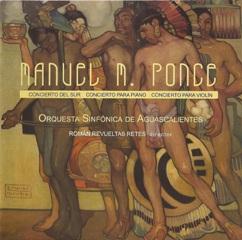Ponce - Piano Concerto - Concierto del sur - Concerto for Violin & Orchestra (2010)
Ponce - Piano Concerto - Concierto del sur - Concerto for Violin & Orchestra (2010)

Concierto 'Romántico' - Concerto for Piano and Orchestra 1. Allegro appasionato 7:11 2. Andantino amoroso 3:56 3. Allegretto 9:00 4. Finale (Allegro) 5:07 Concierto 'del Sur' - Concerto for Guitar and Orchestra 5. Allegretto 14:25 6. Andante 7:34 7. Allegro moderato e festivo 5:46 Concerto for Violin and Orchestra 8. Allegro ma non troppo 16:11 9. Andante espressivo 6:59 10. Vivo guiocoso 8:51 Guadalupe Parrondo - piano Alfonso Moreno - guitar Román Revueltas Retes - violin Orquesta Sinfónica de Aguascalientes Román Revueltas Retes - conductor (1 - 7) Jose Guadelupe Flores - conductor (8 - 10)
While it was ultimately the work of later Mexican composers to explore and define an indigenous Mexican classical music, the more European-influenced Manuel Ponce was the earliest internationally successful Mexican composer of classical music. If Silvestre Revueltas might be considered Mexico's Charles Ives and Carlos Chávez Mexico's Aaron Copland, Ponce is probably more analogous to a composer like Edward MacDowell. But unlike MacDowell who died prematurely, Manuel Ponce lived well into the 20th century and wrote some of his most durable masterpieces during this period of unprecedented cultural transformation to which even he was not completely immune.
Ponce was born on December 8, 1882, in the same year as Igor Stravinsky, halfway around the world in a tiny Mexican village called Fresnillo in Zacatecas although within months his family moved to the larger town of Aguascalientes where he eventually developed as a composer, performer and musical scholar at a time when Mexican classical musical culture was dominated by Europe. Active as an organist, teacher and music critic, Ponce also proved himself so formidable a pianist that he was sent off to further his studies in Bologna and Berlin from 1904 to 1908, stopping off in St. Louis en route to give his first recital in the United States. Ponce's four-year European apprenticeship was to be the first of several lengthy sojourns abroad for Ponce, who also lived in Havana from 1915 to 1917 and in Paris from 1925 to 1933. Paradoxically, it was in Paris that he first came to terms artistically with his Mexican cultural roots while befriending the French composer Paul Dukas. Throughout all his years of travels, Ponce always returned to his homeland, at one point heading the National Conservatory in Mexico City, at another serving as editor of the journal Cultura Musical and teaching folklore at the University, all the while composing works in a variety of idioms. He died in Mexico City on April 24, 1948.
The centerpieces of Manuel Ponce's compositional output are his three concertos, each of which reflects a different aspect of his musical persona. The first, the Concierto romantico for piano and orchestra, completed in 1910 and premiered in 1912, is a full-blown heroic romantic epic characteristic of fin-de-siecle Europe. A showcase for the virtuosity of the composer, who was the work's original soloist, it still has the power to dazzle audiences. The Violin Concerto (1943), his last completed major work, reflects Ponce's absorption of modern international trends, recalling works by his more forward leaning contemporaries such as Béla Bartók, Bohuslav Martinu and Serge Prokofiev. It is by far the most musically progressive of Ponce's works but still retains his prodigious melodic and rhythmic gifts and occasional folkloristic underpinnings. The original soloist was none other than the great Henryk Szeryng.
The third and best known of Ponce's concertos, the Concierto del Sur (1941), was the result of the advocacy of an even more legendary performer, guitarist Andrés Segovia, who premiered the concerto, and to whom the work is dedicated. Concierto del Sur, while incorporating elements of Mexican folklore, makes frequent allusions to a different south as well, the southern European country Spain and its dazzling tradition of flamenco. Ponce's guitar concerto has been recorded by such renowned soloists as Segovia, John Williams, and most recently, Sharon Isbin. It is the crowning work in a guitar catalog that includes five sonatas and numerous smaller pieces, which together have earned him the admiration of classical guitarists around the world. ---peermusic-classical.de
download (mp3 @320 kbs):
yandex mediafire ulozto gett bayfiles








